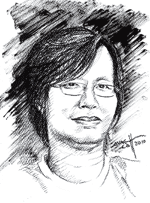
COMMENTARY
| By KYAW ZWA MOE | Friday, January 13, 2012 |
“I will be very happy to meet my family,” Nilar Thein said over the phone today, just minutes after stepping through the gate of Tharrawaddy Prison. At the time, her family was in fact on the way to greet her, and her husband was in the process of being released from Taunggyi Prison in Shan State.
“What Daw Aung San Suu Kyi and President Thein Sein are doing right now is what we had been expecting for many years. I want them to get more meaningful things done,” she said.
When asked for her response to the release of political prisoners, she remarked “many thanks” before being swarmed by political colleagues who were waiting outside the prison for her and other political prisoners to emerge.
 |
| Kyaw Zwa Moe is managing editor of the Irrawaddy magazine. He can be reached at [email protected]. |
“My daughter will understand me one day why I have to leave her,” Nilar Thein said prophetically at the time. Soon after the interview, she was arrested and later sentenced to 65 years imprisonment, the same term as her husband. The couple also served lengthy periods of imprisonment in the 1990s.
Nilar Thein and her husband Jimmy were among the 651 prisoners released today as part of an amnesty negotiated between pro-democracy leader Aung San Suu Kyi and President Thein Sein. The group included many prominent political prisoners, including Min Ko Naing and the other leaders of the 88 Generation Students group, Shan ethnic leader Hkun Htun Oo and all other imprisoned ethnic leaders, and dissident monk Ashin Gambira.
Prisoners who were sentenced on charges related to their connection to armed groups were not released, but Khin Nyunt, the former chief of the military intelligence and prime minister who was arrested in 2004 on charges of corruption, was set free along with other former MI officers.
The release of political prisoners, which has been a persistent demand of Burmese political activists and the international community, constituted the first concrete reform in 2012. The move was especially welcome following the “cruel clemency” of two weeks earlier, where instead of the anticipated release of a substantial number of political prisoners, only around 30 of the over 6,000 prisoners that were freed were political activists.
Thein Sein and his government deserve congratulations for the bold move in the face of internal opposition, but key issues remain that they must address in 2012. These issues will be a barometer used to assess whether Burma is making continued progress towards genuine democracy.
The first test will be whether the government conducts the April 1 by-election in a free and fair manner. The chief of Burma’s Election Commission, ex-Gen Tin Aye, said in December that the by-election will be free and fair, but it is not yet certain the government will allow independent organizations to monitor the election to determine whether this is the case.
If the election is free and fair, then Suu Kyi and many of her NLD colleagues are certain to win seats in Parliament. But if the government rigs the election through fraud and manufactured “advanced votes” the way it did for the November 2010 polls, then neither Suu Kyi nor her fellow candidates stand a chance.
The by-election is only a contest for 48 vacant seats out of 1,158 seats in the Lower and Upper Houses of Parliament. A vast majority of those seats are firmly occupied by the military-backed Union Solidarity and Development Party and the appointed military candidates, and that will not change in the by-election. But the mere fact that Suu Kyi and the NLD will participate makes the polls extremely significant, and if they are free and fair it will be another indication that Burma is on the right track.
Another big issue to be addresses in 2012 is the country's ethnic conflict, which has roots more than six decades old and involves issues of autonomy that will be very difficult to solve.
1 | 2 


Thailand Hotels
Bangkok Hotels
China Hotels
India Hotels

|